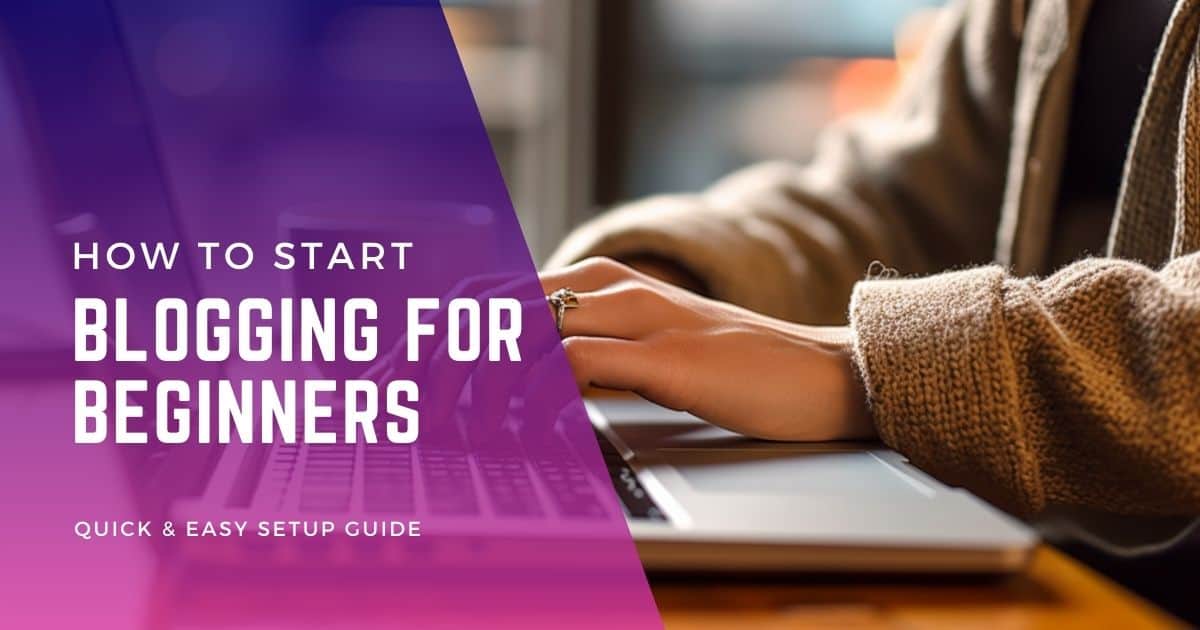Considering starting a blog? You’re probably looking for clear, practical tips on blogging for beginners. Blogging is an excellent way to express yourself, share insights, and earn from your skills.
One major challenge is knowing how to begin and differentiate yourself in a saturated market. This challenge can seem daunting as you aim for early growth and audience interaction.
The key is producing high-quality content and engaging consistently with your audience. By aligning your blog with your readers’ needs, employing SEO effectively, and using social media, you can make your blogging efforts fruitful.
Drawing on extensive blogging experience, I’ve witnessed the impact of strategic blogging in attracting and expanding an audience. Consider this your concise guide to making blogging for beginners a successful endeavor, ensuring your voice resonates across the community.
Starting Your Blog
Are you ready to share your thoughts, ideas, and expertise with the world through your own blog?
Choosing Platform
When starting blogging for beginners, selecting the right platform is crucial. WordPress, Blogger, and Wix are popular choices. Consider customization options, user-friendly features, and pricing when evaluating platforms. Each has its pros and cons; for instance, WordPress offers extensive customization but may require more technical knowledge.
Research Blogging Platforms
Researching different blogging platforms helps you make an informed decision based on your needs. For example, if you prioritize ease of use over advanced features, Blogger might be suitable. Some platforms offer templates for quick setup, while others allow more intricate design modifications.
Comparing the user-friendly features can simplify your blogging experience as a beginner. Look for drag-and-drop interfaces or intuitive editing tools that streamline content creation without requiring coding skills.
Establishing Niche
Identifying your niche is essential in blogging for beginners. Determine what topics you are passionate about or have expertise in to create engaging content consistently. Research existing blogs within your chosen niche to gain inspiration and understand audience preferences.
Find Unique Angles
Finding a unique angle within your niche sets you apart from competitors and attracts a specific audience interested in your perspective. For instance, if fashion is your niche, focus on sustainable fashion or thrifting tips to carve out a distinct space in the market.
Exploring various niches before finalizing one ensures you choose an area where you can provide valuable insights and connect with like-minded individuals.
Setting Goals
Defining clear goals is vital for beginners when venturing into blogging. Specify measurable objectives, such as reaching a certain number of monthly page views or growing an email subscriber list by a set percentage within six months.
Determining the desired audience size helps tailor your content strategy to attract and retain readers effectively. Setting engagement goals like increasing comments per post encourages interaction with your audience and fosters community building around your blog.
Establish “realistic timelines” aligned with each goal to track progress effectively and adjust strategies as needed.
Crafting Your Content
Crafting compelling content is important for captivating your audience and driving engagement. You can grab attention and keep readers eager for more by delivering clear and concise information. Mastering this skill will set you apart and boost your blog visibility quickly.

Compelling Headlines
Crafting attention-grabbing headlines is important in blogging for beginners. Use power words and emotional triggers to make your headlines compelling.
For instance, instead of “Tips for Blogging,” try “Master the Art of Blogging with These Insider Secrets.” Testing different headline variations can help optimize click-through rates, ensuring more readers engage with your content.
Strong Introductions
A strong introduction is key. Hook readers with a captivating opening sentence or question that sparks their curiosity.
Clearly state the purpose or benefit of reading your blog post upfront to set expectations. Keep introductions concise yet informative by providing a glimpse into what readers can expect from the rest of the content.
Detailed Outlines
Creating detailed outlines before diving into writing can significantly improve your blogging process as a beginner. An outline helps you organize your thoughts and structure your post effectively.
Break down main points into subheadings to enhance readability and seamlessly guide readers through your content. Including relevant statistics, examples, or anecdotes within each section adds depth and credibility to your blog posts.
SEO Best Practices
Grow your website’s visibility and drive more organic traffic with effective SEO strategies. By optimizing your site for search engines, you can attract more potential customers and increase your online presence. Discover the power of SEO to elevate your digital marketing efforts.

Understanding SEO
Understanding SEO is crucial. Start by learning about keyword research and using relevant keywords in your content. Incorporate key phrases naturally to improve search engine visibility. Optimize your meta tags, headings, and URLs with these keywords.
Aligning Search Intent
To enhance your blog’s effectiveness, aligning your content with users’ search intent is vital. You can increase visitor engagement and reduce bounce rates on your site by offering information or solutions that directly address their queries.
Make sure to tailor your blog posts to match what people are searching for online, providing relevant and helpful content to keep them engaged and improve your search engine ranking.
Meet the User’s Needs
High-quality content that meets users’ needs improves engagement and signals to search engines that your website provides valuable resources related to specific topics or keywords.
This alignment between user intent and content helps establish authority in your niche over time as more visitors find value in your offer.
Answer Common Questions
Strive to create informative posts that effectively answer common questions within your industry or niche.
By consistently delivering valuable insights aligned with user intent, you build trust among readers while enhancing the overall quality of traffic directed toward your blog through organic searches.
Create a Linking Strategy
To enhance your blog’s SEO, grasp the importance of backlinks and internal linking strategies. Backlinks from reputable sites can boost your credibility with search engines.
Internal links within your website guide readers to related content, improving user experience and helping search engines navigate your site efficiently.
Internal Links
Incorporating internal links strategically throughout each post guides readers seamlessly to other relevant articles on similar topics within their interest range while navigating smoothly through different website sections.
By placing internal links thoughtfully within posts based on relevance rather than just for the sake of adding them, you enhance the reader experience by facilitating easy access to additional information and signal strength regarding important pages across various categories present on the blog.
Enhancing Readability
Boost your content’s impact with simple tweaks that make it easier to read and understand. Enhancing readability is crucial for engaging your audience, increasing retention, and driving action. Discover how to captivate your readers from the start and keep them hooked throughout.

Editorial Calendar
Creating an editorial calendar is a must-have for beginners in blogging. This tool helps you plan and organize your blog content effectively. By scheduling regular posting dates, you consistently share posts with your audience.
The calendar also assists in tracking ideas, deadlines, and upcoming promotions to ensure a well-rounded content strategy.
Planning your structure
An editorial calendar can be as simple as a spreadsheet or a dedicated planner where you outline your post topics, keywords, and publishing dates.
For instance, if you run a food blog, you could plan to post recipes every Monday and restaurant reviews every Friday. This structure keeps you organized and sets clear expectations for your readers on when to expect new content.
Writing Consistency
Consistency is key in blogging; it helps build trust with your audience and improves search engine rankings. Using an editorial calendar to map out your content schedule ahead of time reduces the last-minute rush of coming up with blog topics or missing posting deadlines unexpectedly.
Seeking Feedback
Encouraging reader feedback is crucial when starting in the world of blogging. Invite your audience to leave comments on your posts by asking questions or prompting discussions at the end of each article.
Constructive criticism from readers can provide valuable insights into what resonates with them and areas where improvements are needed.
Connect with Other Bloggers
Joining blogging communities or forums offers an excellent opportunity to connect with other bloggers who can provide objective feedback on your work.
Engaging in these platforms allows you to learn from experienced writers and receive constructive criticism that can help enhance the quality of your writing style and overall engagement levels on your blog.
Study the Feedback
Utilize feedback from readers and fellow bloggers as a learning tool rather than taking it personally.
Analyze common themes in the comments received – whether positive or negative – to identify trends that can guide future content creation decisions based on what appeals most to your target audience.
Leveraging Social Media
Use the power of social media to amplify your brand’s reach and engagement. By strategically leveraging platforms like Instagram and Facebook, you can connect with your target audience meaningfully, driving conversions and building brand loyalty.

Promoting Blog
Utilizing social media platforms is crucial for beginners in blogging. Sharing posts on platforms like Facebook, Twitter, and Instagram can help increase visibility.
- Engage with online communities by commenting on relevant posts and discussions to attract more readers.
- Collaborating with other bloggers or influencers can provide opportunities for cross-promotion, expanding your reach.
Promote Engagement
Engagement is key when promoting your blog through social media. By actively participating in discussions about your niche, you can establish yourself as an authority figure and drive traffic to your blog organically.
For instance, if you have a cooking blog, joining food-related groups on Facebook or Reddit can help you connect with individuals interested in your content.
Cross-promote
Cross-promotion with other bloggers or influencers is a powerful strategy to expand your audience quickly. This collaboration involves sharing content on respective platforms to introduce followers from one account to another.
For example, if you collaborate with a fitness influencer and share each other’s workout tips or healthy recipes, both audiences benefit from the shared expertise.
Building Email List
Building an email list should be a priority for beginner bloggers as it helps nurture relationships with readers outside of social media algorithms’ constraints.
Offering incentives such as e-books or exclusive content encourages visitors to sign up for newsletters via strategically placed opt-in forms throughout the blog.
Creating Incentives and Offers
Providing valuable incentives like free downloadable guides or access to exclusive content motivates visitors to subscribe to your email list willingly.
Placing opt-in forms strategically within high-traffic areas of the blog increases the chances of capturing leads effectively without being intrusive.
Stay Consistent with Emails
Sending regular newsletters containing updates about new blog posts, exclusive offers, or personalized messages helps maintain engagement levels with subscribers over time.
Nurturing these relationships through consistent communication ensures that subscribers remain connected and interested in future content.
Monetizing Your Blog
Looking to make money from your blog? Learn how to turn your passion into profit by monetizing your content effectively. Discover practical strategies to generate income and grow your online presence.
Optimizing Strategies
Analyzing website analytics makes all the difference for new blogs. By identifying high-performing content, you can focus on optimizing it further to attract more readers.
Experimenting with various SEO techniques helps improve your blog’s visibility in search engine results, driving organic traffic to your site.
Staying updated with the latest trends and strategies in the blogging industry ensures that you implement current best practices, keeping your blog relevant and competitive.
Optimization Tools
Use tools like Google Analytics to track which posts receive the most views or engagement. For example, if a blog post about “Top 10 Travel Destinations” garners significant traffic, you can create similar content or update existing posts to capitalize on this interest.
Moreover, you can tailor future content by understanding what resonates with your audience through analytics data.
It’s important to use SEO in your blog to make it easier for people to find. Use keywords that match what you write about. Add descriptions and alt text to images so search engines can show your blog higher in search results.
Analyzing Performance
Analyzing performance data is crucial for making informed decisions and driving success. By dissecting key metrics and trends, you can pinpoint areas for improvement and optimize strategies for maximum impact.

Monitoring Performance
To gauge the success of your blog, track key metrics like page views, bounce rates, and average time on page. Utilize tools such as Google Analytics to understand audience behavior better. By knowing what works and what doesn’t, you can refine your blogging strategies for continual growth.
Identify Trends
Consistent monitoring allows you to identify trends in audience engagement. For example, if a particular post has a high bounce rate but low time on page, it may indicate that the content does not resonate with readers. In contrast, posts with high page views and shares show topics that capture interest.
Regularly analyze performance data to make informed decisions about your content strategy. If certain post types consistently perform well while others underperform, adjust your focus accordingly. This iterative process of tracking and adapting based on analytics is crucial for sustained blog success.
Updating Content
Keep your blog fresh by reviewing and updating outdated information in older posts. Adding new insights, recent statistics, or relevant examples can breathe new life into existing content.
By refreshing posts periodically with up-to-date information, you maintain relevance and credibility with your audience.
Repurposing Content
Repurposing existing content into different formats can extend its reach and visibility across various platforms.
For instance, turning a popular blog post into an infographic or video can appeal to audiences who prefer visual content consumption. This approach diversifies your content and attracts a broader range of viewers.
Consider repackaging evergreen blog topics into guides or ebooks that offer comprehensive insights for readers seeking in-depth knowledge on specific subjects. By transforming static written content into interactive resources like webinars or podcasts, you cater to different learning preferences among your audience segments.
Engaging With Audience
Engage your audience effectively by creating content that resonates with their interests and needs. By understanding your audience’s needs, you can build stronger connections and drive meaningful interactions that increase your brand’s loyalty and growth.

Connecting Audience
Engaging with your audience is crucial in blogging for beginners. Respond to comments, messages, and emails promptly and genuinely. By showing that you value their input, readers are more likely to engage further.
Encouraging discussions among readers can foster a sense of community on your blog. Pose questions at the end of your posts to prompt responses or create polls on social media platforms. This interaction keeps readers engaged and helps build a loyal following.
When someone asks a question or provides feedback, take the time to respond thoughtfully. Acknowledge their input and address any concerns they may have. This level of engagement demonstrates that you care about what your audience thinks and value their participation.
Utilizing AI
In blogging, Artificial Intelligence (AI) can be a valuable ally for beginners. AI-powered tools can assist in content creation, editing, and even topic generation. These tools help streamline processes and improve efficiency.
Chatbots are another useful AI application for bloggers starting. They can provide instant support by answering frequently asked questions or directing users to relevant resources on your blog efficiently.
AI algorithms play a significant role in data analysis for blogging strategy optimization. By leveraging these algorithms, you can gain insights into reader behavior patterns, popular topics, and best posting times – all essential elements for successful blogging.
Advanced Blogging Tips
Boost your blog’s impact with these expert strategies. Learn how to captivate your audience and drive engagement like never before. Master the art of advanced blogging to skyrocket your online presence.
Write 100 Posts
Setting a goal to write and publish 100 blog posts can help your blog succeed. Break it into smaller goals, like 10 posts per month, to stay motivated. Celebrate each milestone you reach. Research successful blogs in your niche to see what works and make your content unique.
Remember to make your editorial calendar with deadlines for each post to stay organized. Engage with your audience for new ideas and reach your 100-post goal. Stand out by developing a unique writing style or offering specialized knowledge. Consistency is important for credibility and growing your audience.
Final Thoughts
Starting a blog can seem complex, but this guide simplifies the process for beginners. We’ve outlined key steps from selecting a platform to creating engaging content and optimizing for search engines. The aim is to provide actionable strategies to make your blog noticeable and engaging for your target audience.
I invite you to begin blogging with these tips in mind. Feel free to share your experiences or ask questions in the comments—let’s create a supportive community for growth and learning.
Look forward to upcoming posts that will offer more insights into blogging for beginners, focusing on advanced strategies to enhance your blogging efforts. The adventure is just starting, with many opportunities ahead.
FAQs
How can a beginner start blogging?
To start blogging as a beginner, select a niche, choose a blog name, register a domain, select a hosting service, set up the blog platform, create a dedicated email, establish a social media presence, and install essential plugins for functionality and SEO optimization.
How do I start a blog with no experience?
Beginners can start a blog by selecting a descriptive name, getting online hosting, customizing the blog with a template, writing and publishing the first post, promoting the blog through social media and SEO, and exploring monetization options like affiliate marketing and ads.
Do beginner bloggers make money?
Beginner bloggers can earn income primarily through affiliate marketing, display advertisements, and sponsored content. These accessible methods can provide a quick start to generating revenue from blogging.
Which blog platform is best for beginners?
WordPress is the best platform for beginners due to its extensive customization options and ease of use. Alternatives like Wix, Squarespace, and Blogger offer unique features suitable for different blogging needs and skill levels.



